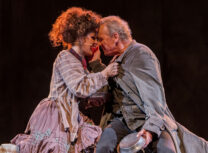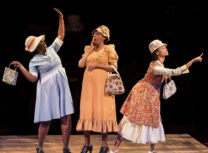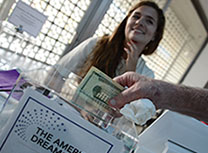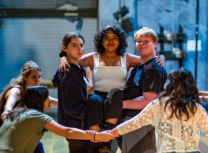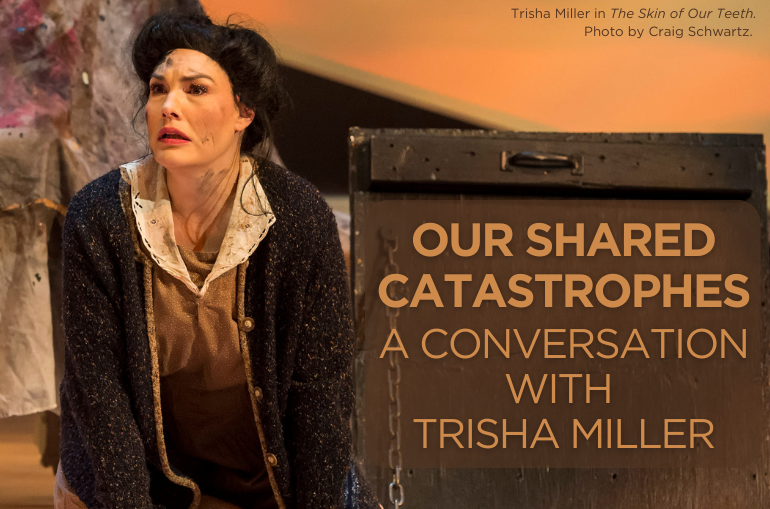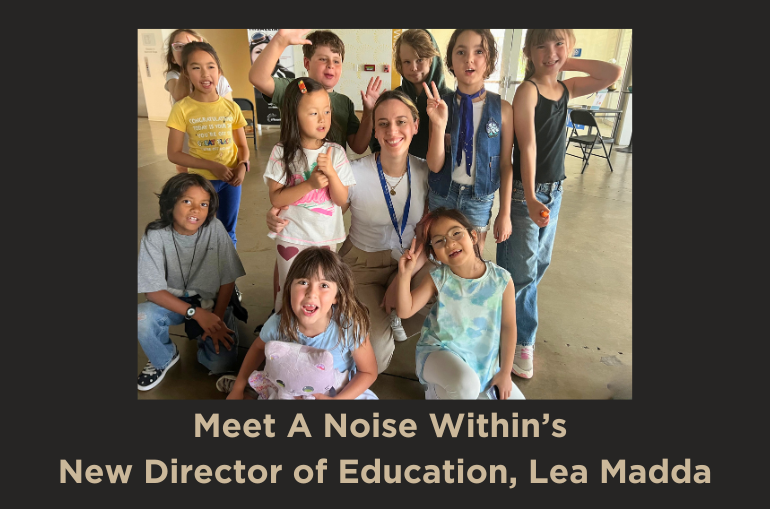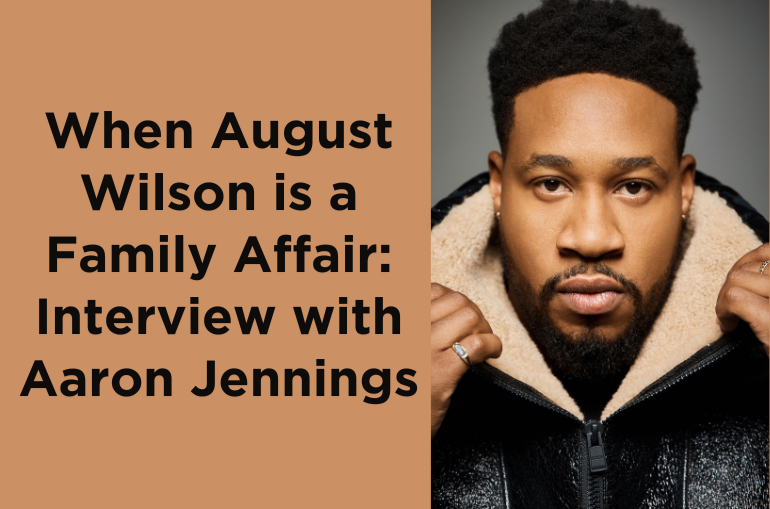You Asked, We Answered: The Threepenny Opera
By A Noise Within
March 17, 2015
After each performance at ANW, patrons are asked to fill out a post-show survey. Here are some answers to a few popular questions.
What voice training have you had as an actor? How did you prepare for all the singing in this play?
Marisa Duchowny (Polly Peachum): Growing up, I never took voice lessons. Singing was fortunately a gift I was born with and always came very naturally to me. Later, in graduate school, I learned the fundamental techniques, but I truly learned how to sing by sitting alone in my bedroom as a little girl and mimicking the sounds of the soulful Ella Fitzgerald, Whitney Houston, Simon & Garfunkel, and The Beatles. So preparing to sing as Polly Peachum was very much out of my comfort zone. Warming up before every rehearsal and performance was essential in order to expand my range and sing clearly in Polly’s high mezzo soprano register. I also put a lot of my attention on the text sung in each song. I think it’s important to emphasis the story behind the words and take the audience on a journey as if they are hearing a character speak a monologue. It was also very helpful to have our wonderful musical director, DeReau Farrar, there to support the technical aspects of the songs and stay true to the music of Kurt Weill.
Andrew Ableson (Macheath): I’ve had no formal singing training apart from the most basic breathing exercise we were taught in the first term of my Drama degree at university. My voice really has been “trained” by using it in many musicals, cabarets and nightclubs I have sung at. I was the lead singer/lyricist of a rock band in San Francisco in the 90’s called The Magnetic, and we played often both in the Bay Area and Los Angeles. It was a very different style of singing, but just as exciting.
I prepare for the show by going to the gym and doing at least a half hour of good cardio to open up my lungs, and a sauna or steam to moisten my vocal chords–it works every time. I also suck a few mentholated sweets through the show to help open up “the tubes.” Thanks for the question!
How did you train vocally?
Matthew Ian Welch (Sawtooth Bob): My vocal training began in college and hasn’t stopped since. I got my start singing with choirs and taking private lessons. I learned how my voice worked and how to take care of it. Since graduating, much of my development has come from professional experience. I have sung principal roles in over 20 operas and musicals, and I have sung as a section leader with a number of choirs and small ensembles. I practice by recording myself and then listening to the recording. This process can be brutal, but it’s the only way to know what others are really hearing when you open your mouth.
How did you learn the Cockney accent?
Matthew Ian Welch (Sawtooth Bob): I have always had a knack for imitating voices and accents, but a knack will only take you so far. I primarily learned a Cockney accent by listening to recordings of authentic speakers and imitating them. I have also studied the “rules,” or the most common shifts in vowels and changes in consonants as catalogued by linguists. For this show, specifically, the assistance of ANW’s dialect coach, Nike Doukas, has been indispensable.
What challenges did you deal with in making an historically provocative piece of theatre accessible to the modern audience and times?
Julia Rodriguez-Elliott (Co-Director): This is a very good question, and one that all directors must look straight in the eye. On the one hand, what’s remarkable is that The Threepenny Opera was way ahead of its time in so many ways—it was the precursor of edgy musicals like Cabaret and the forerunner of ‘70s and ‘80s performance art—that it doesn’t need to be modernized per se. But while many of the themes, though certainly relevant today, were based on actual events of the early 20th century, so we needed to make these very clear. One way we did this was through the use of themed placards, which are displayed even before the play starts. At the same time, we have emphasized key lines and textual components that make the milieu and themes very clear to modern audiences—it’s a question of playing these up without being overbearing or obvious. For instance, one message we absolutely wanted to convey was how the privileged classes get away with figurative murder while the lower ones are actually convicted. This said, the themes are so rife and rich that they stand on their own, and our conversations with audience members tell us that they’re really seeing the contemporary parallels to the world Brecht portrays.
Did Deborah have as much fun doing her big number as it looked? Did she have trouble being so physical while wearing all that padding?
Deborah Strang (Mrs. Peachum): It’s more fun that you can even imagine. Brecht always attempted to remind his audience that they were watching a performance and that there is no separation between the actor and the spectator. While breaking the fourth wall is always a bit terrifying, our patrons are always such good sports and give me lots of encouragement every time. The padding gives me the freedom to be wild. Hopefully I’m losing a pound or two during each performance! (And thanks for assuming it was padding).
How does the music and sound of the play reflect Brecht’s ideas?
DeReau Farrar (Music Direction and Composer): When picking up the score to The Threepenny Opera, one has to wonder why Kurt Weill opted for a brassy and percussive orchestration instead of one filled with strings and softer sounds. Remember, this music comes near the beginning of the Jazz Era, as we have come to define it today, and we haven’t yet seen the popularization of big bands! I think the answer lies somewhere in that, prior to being used for jazz, this orchestration (trumpets, trombones, saxophones, and percussion) was primarily used in European military brass bands. When we hear it today, it reminds us of jazz, but when they heard it then, it reminded them of the military. He has paired the arrogant brashness of this sound with elements of European folk music, represented by banjo, guitar, piano, harmonium, bandoneon, and even more percussion. In this way, Weill has humbled the militaristic brass and exalted the folky rhythm and harmony, and married them together as equals to represent Brecht’s charge for the poor against the establishment.
Brecht’s play is very much a slice of life, and the music reflects this. It’s an expressionistic slice of life, to be sure, but the world he depicts is a loud, noisy working-class one. The orchestration reflects a well-controlled chaos not unlike that of the lives of the characters Brecht portrays. More than anything, the dramatist was resolute that his play serve as an agent of social change. So the music has to be a bit brash, a bit in-your-face, so that we feel it with the same intensity as we experience the characters’ lives through their actions, costuming, and—of course—words. In fact, the very forthright nature of the band—a far cry from the more genteel theatrical music of the day—was part of Brecht’s plan, and it strikes us with the same passion and power today as it did to audiences then.
